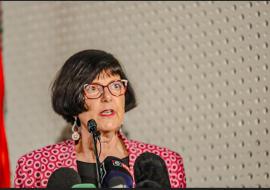
While law enforcement maintained a constant presence throughout the festive season, conducting operations around the clock - the preliminary 2024/2025 Festive Season Statistics reveal a concerning increase in crashes and fatalities, primarily attributed to human behavior.
“Tragically, South Africa witnessed 1,502 deaths resulting from 1,234 fatal crashes during the 2024/25 festive season. The number of fatalities represents a year-on-year increase of 5.3% (70) compared to the 2023/24 festive season, with a 4.2% (50) increase in the number of crashes,” Transport Minister Barbara Creecy said during a media briefing, held in Pretoria, on Monday.
The preliminary 2024/2025 Festive Season Statistics indicate that 87% of crashes happened because of human behaviour, including hit-and-runs, jay-walking (pedestrians crossing or walking in the street or road unlawfully), fatigue, loss of control over vehicles, speed, drunken driving, and reckless overtaking.
“The number of people who died on our roads this festive season has increased because people continued to behave badly. In spite of our pleas and warnings, and notwithstanding our efforts to clamp down on irresponsible and reckless behaviour, it is clear that many road users – both drivers and pedestrians – continue to act without regard for the lives of others.
“Six provinces recorded increases in the number of fatalities in the 2024/25 festive season compared to 2023/24, namely KwaZulu-Natal, Eastern Cape, Free State, Limpopo, Northern Cape and North West,” the Minister said.
The Eastern Cape, KwaZulu-Natal and Free State recorded increases of 70, 54 and 21 fatalities as compared to 2023/24, while Gauteng, Western Cape and Mpumalanga recorded decreases of 76, 23 and 15 fatalities, respectively.
Concern over pedestrian fatalities
Creecy said pedestrian fatalities remain a huge concern, with 41% of all road fatalities being pedestrians.
The highest percentage of pedestrian fatalities were recorded in Gauteng, Western Cape and KwaZulu-Natal, which are the most populous provinces in the country in terms of vehicles and people.
Gauteng had the highest pedestrian fatalities at 63.84% followed by Western Cape with 53.9% and KwaZulu-Natal with 44.33%.
During this period, law enforcement conducted joint operations in line with the focus areas, including vehicle road worthiness, public passenger transport, drunken driving, execution of warrants of arrest, and speed law enforcement.
Law enforcement officers issued 711,184 fines for various traffic offences across the country.
“Some 23,607 fines were issued to drivers who failed to wear seatbelts, while another 16,925 motorists were fined for using cell phones while driving. Then, 16,527 vehicles were found to be unroadworthy and issued with traffic fines, as well as their motor vehicle licence discs removed, particularly in areas where vehicles could not be impounded due to lack of impoundment facilities,” the Minister said.
In total, 8,917 motor vehicles were impounded in areas where facilities were available.
“To clamp down on drunken driving, speeding and other moving violations, our officers arrested more than 9,550 motorists, with 3,840 individuals arrested for drunken driving.
“A total of 414 drivers were arrested for driving at high speed and five amongst them were driving at excessive speeds of between 200km/h to well above 240km/h,” Creecy said.
The highest speedster was arrested in Gauteng, driving at 245km/h (kilometre per hour) in a BMW Sedan on N1 near Honeydew, on 18 December 2024.
“We, South Africans, must change our behaviour on the roads. As we said at the beginning of the festive season, government and our law enforcement agencies cannot do it on our own.
“The statistics clearly send all of us, as South Africans, one message: Drivers and pedestrians must change their behaviour. We must obey the law, we must obey the basic rules of the road,” Creecy said.
Interventions
The Minister has asked the provinces to conduct a detailed analysis of their respective statistics, and come up with a clear plan for the way forward, by the end of January.
This will include a look at severe consequences for those who continue to show a disregard for road safety.
“We will continue to direct our efforts at changing the behaviour of road users, invest in designing and engineering safer roads, enforcing safe speeds in high congestion areas, and enhancing emergency response systems and access to quality trauma care, which is essential to saving lives.
“By reducing response times and improving the availability of critical care, we can increase survival rates and reduce the long-term impacts of road traffic injuries. This initiative will require collaboration with the Department of Health, and other industry role-players,” she said.
Creecy said indications are that the implementation of 24/7 traffic policing shifts is more critical than ever.
“During the festive season, we agreed to release National Traffic Police resources to provinces, to intensify road safety communication and education campaigns and strengthen monitoring of our law enforcement operations especially at night.
"This approach will serve as a blueprint for our road safety activities but will only succeed if it is consistent all year round, especially on weekends and in every province across the country,” the Minister said. -SAnews.gov.za


